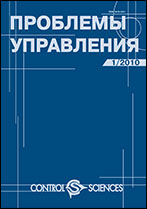|
Short communications
Scenario methods to improve the efficiency of implementing the life cycle of program-target management: a conceptual analysis
I. V. Chernov
Trapeznikov Institute of Control Sciences, Russian Academy of Sciences, Moscow, Russia
Abstract:
This paper is devoted to methodological and applied problems of improving the efficiency of program-target planning and management in socio-economic systems based on a scenario approach. The main features of the methodology and mechanisms of program-target management are considered. The idea proposed below is to manage and control the implementation of target programs using a scenario approach and life cycle models. A scenario W-shaped life cycle model is developed to improve the efficiency of program-target planning and management. This model involves the end-to-end methodology of proactive management to implement long-term socio-economic programs under uncertainty and risk. The model's methodological core consists of the following mechanisms: scenario analysis, simulation, forecasting, planning, and group management. The new approach is most effective under increasing uncertainty due to its focus on anticipating future conditions and alternatives for the development of socio-economic systems.
Keywords:
planning, management, efficiency, target program, scenario approach, life cycle, uncertainty.
Received: 16.08.2021
Accepted: 31.08.2021
Citation:
I. V. Chernov, “Scenario methods to improve the efficiency of implementing the life cycle of program-target management: a conceptual analysis”, Probl. Upr., 2021, no. 5, 88–93; Control Sciences, 2021, no. 5, 77–81
Linking options:
https://www.mathnet.ru/eng/pu1259 https://www.mathnet.ru/eng/pu/v5/p88
|

| Statistics & downloads: |
| Abstract page: | 63 | | Russian version PDF: | 25 | | English version PDF: | 9 | | References: | 22 |
|




 Contact us:
Contact us: Terms of Use
Terms of Use
 Registration to the website
Registration to the website Logotypes
Logotypes







 Citation in format
Citation in format 